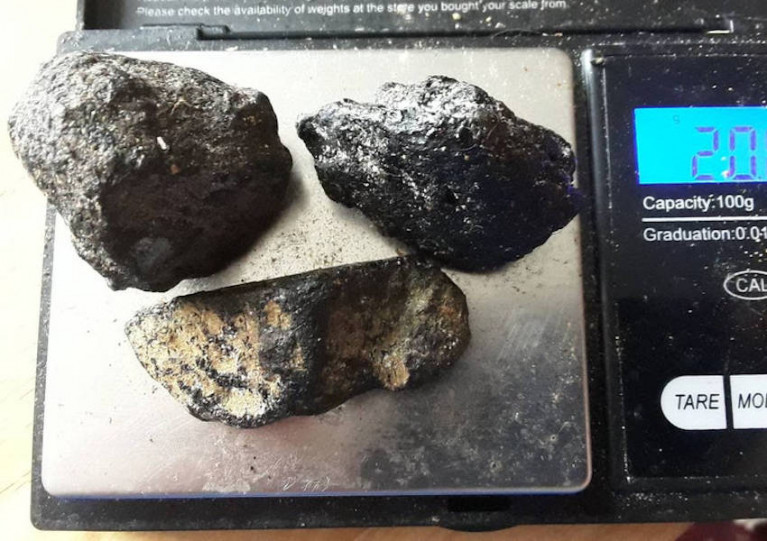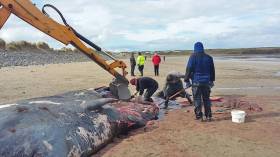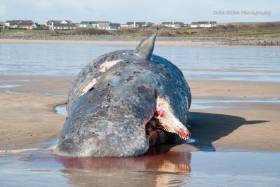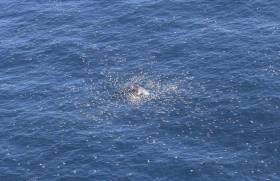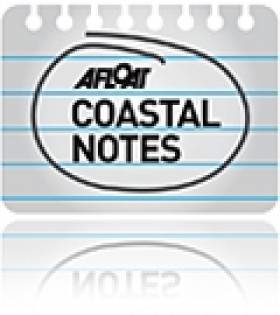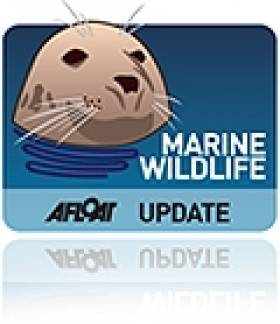Displaying items by tag: Sperm Whales
Dedicated Reserve for Sperm Whales To Be Created off Caribbean Island
Irish waters are home to almost 400 sperm whales, and now the Caribbean island of Dominica says it intends to create the world’s first dedicated reserve for this particular cetacean.
Dominica has some 200 species named after the waxy substance, spermaceti, which is found in their heads.
Sperm whales were a primary target of the commercial whaling industry from 1800 to 1987, and their population is still recovering and listed as an endangered species.
They have one of the most extensive global distributions of any marine mammal species, extending from the Arctic to the Antarctic.
Their population can be calculated by their distinctive echo-location “clicks” which can be heard over many tens of kilometres.
A survey team from Galway-Mayo Institute of Technology, now ATU, and the Scottish Sea Mammal Research Unit Consulting estimated 380 sperm whales in Irish waters in a study published three years ago.
Dominica’s prime minister Roosevelt Skerrit has said commercial fishing and large ships will be banned in an area off the island's western coast measuring almost 800 sq km (300 sq miles) under plans for the new reserve.
"Their ancestors likely inhabited Dominica before humans arrived. We want to ensure these majestic and highly intelligent animals are safe from harm and continue keeping our waters and our climate healthy," the prime minister said in a BBC report.
He said that commercial fishing will not be permitted in the reserve, while inshore or artisanal fishing which does not endanger the whales will be permitted.
Tourist numbers for viewing the whales will be restricted, and large ships will be required to use designated ocean corridors off the Caribbean island.
Irish waters within the exclusive economic zone were declared a whale and dolphin sanctuary in 1991.
Read the BBC report is here
Recent Whale Strandings No Longer Considered ‘Unusual’, IWDG Says
The Irish Whale and Dolphin Group (IWDG) says it’s clarified its opinion on recent whale strandings in Donegal, explaining that the evidence does not suggest an “unusual mortality event” or UME.
It has been feared the strandings of two female sperm whales — at Maghery and on Malin Head respectively — were linked to Russian military exercises in the North Atlantic, as Afloat.ie reported last weekend.
But upon reviewing the data of marine wildlife strandings on the Irish coast between 15 and 21 February, including a female Cuvier’s beaked whale and a female long-finned pilot whale, the IWDG says that the incidents do not deviate from the expected annual stranding figures.
“Before any claims can be made calling this a UME or linking these current deaths to the military testing, additional evidence is needed,” IWDG strandings officer Stephanie Levesque said.
“We must wait to see if any further deep diving species wash up over the next few weeks as these numbers themselves currently are not out of the ordinary.”
However, Levesque added: “Two female sperm whales washed up at the same time is unexpected as most stranded sperm whales in Ireland are mature males.”
Meanwhile, it’s believed that “souvenir hunters” may be responsible for removing jaw bones from the two female whales washed ashore in Donegal.
Levesque told Donegal Live that such practice is common but it’s not known why.
“I don't know who does, but it is something that happens with sperm whales when they strand — the lower jaw is the first thing to go,” she said. “I don’t know if people think they are worth something.”
Donegal Live has more on the story HERE.
Fears That Donegal Whale Strandings May Be Linked to Russian Military Drills
It’s feared that at least one whale stranded in Donegal in recent days may have died as a result of Russian military exercises in the North Atlantic.
According to The Irish Sun, a marine wildlife expert investigating the stranding of a female whale at Maghery on Wednesday (16 February) said it appeared “deflated” and that its internal organs had “liquefied”.
Stephanie Levesque, a strandings officer with the Irish Whale and Dolphin Group (IWDG), noted that it is not yet confirmed how recently the animal died but said: “We can’t rule anything out at this point.”
It’s understood that sperm whales, which can dive as much as 800 metres in search of food, can risk their lives by surfacing too fast when disturbed by sonar often employed by military vessels.
But disturbances caused by this week’s double whammy of Storm Dudley and Storm Eunice may have played a significant role.
A second sperm whale found at Malin Head on Thursday (17 February) was also deemed unusual.
Commenting on social media, the Ocean Research and Conservation Association (ORCA) Ireland said: “What stood out was this animals teeth were very worn! Sperm [whales] are the largest toothed predator in the world.”
Before Russia agreed to move its planned military exercises out of Ireland’s Exclusive Economic Zone, Minister of State for Heritage Malcolm Noonan warned that the activity could have “devastating consequences” for marine mammals in the area.
Such concerns prompted the IWDG to back the call from the fishing industry for a moratorium on any and all military exercises within the Irish EEZ.
How an Irish Beachcomber Became Crucial to the Making of the World’s Finest Perfumes
The shores of Ireland’s Wild Atlantic West coast feature prominently in a new documentary about the master perfumer of Dior — but it’s not because their beauty and drama matches that of the finest scents.
It’s all to do with ambergris, the mysterious substance secreted by sperm whales (some might call it ‘whale vomit’) which is a key ingredient in high-end perfumes, transforming their constituent oils and making scents last longer.
But ambergris is not easily found, and that’s where the likes of Patrick Lillis come in. He tells The Irish Times how his beachcombing hobby blossomed into a business when he found that even tiny quantities of the waxy stuff fetch high prices.
To give an example, the largest piece Lillis has found to date weighted just over a kilo and sold for a whopping €15,000. Such is the price that perfumers like François Demachy at Dior — the subject of the new documentary Nose — are willing to put on the product, for which Lillis has developed a keen eye.
The Irish Times has much more on the story HERE.
IWDG Takes Samples From Sperm Whale In Sligo As Unusual Strandings Remain Unexplained
#MarineWildlife - A team from the Irish Whale and Dolphin Group (IWDG) was on site at Streedagh Strand in Sligo yesterday (Thursday 4 April) to investigate the third sperm whale stranding in a matter of days along Ireland’s West Coast.
As reported yesterday on Afloat.ie, the discovery of a third such whale carcass made for an “increasingly unusual stranding pattern”.
While sperm whales are relatively abundant in Ireland’s deep ocean waters, they are rarely found above 300 metres — and male specimens are far more common than the female whale found in Sligo.
The IWDG confirmed that samples were taken from the 10.4m carcass, which showed “no obvious signs of ship collision [or] entanglement, nor was the whale emaciated”.
Examination of stomach contents found no plastic debris and few food remains.
“So as is so often the case with strandings, we know more about what didn’t kill the whale than what did kill it,” the IWDG stated — adding that it is liaising with Scottish colleges after a decomposed sperm whale was found on Uist in the Outer Hebrides, due north of Ireland, in recent days.
The group also notes that multiple warships and submarines are involved in Nato’s annual Joint Warrior exercise ongoing west of the Hebrides.
Sonar activity from military vessels has been suggested as a cause of whale strandings throughout Europe in recent years, including a major event across Scottish and Irish waters last year.
“However, these whales have been dead for one to two weeks so this can’t explain these strandings, unless some active equipment was tested offshore prior to the start of this exercise,” the IWDG says.
#MarineWildlife - A third sperm whale stranding on Ireland’s west coast within just a few days is now a cause for concern, the Irish Whale and Dolphin Group (IWDG) says.
Following the discovery of two sperm whale carcasses on the same day last week — in Donegal and west of the Aran Islands, the latter believed to have beached in Connemara — a third was found washed up on Streedagh beach in Sligo at the weekend.
Images of the latest stranding suggest it is an adult female, which the IWDG describes as “a little unusual” as “generally we get adult male sperm whales off the Irish coast”.
The close proximity of the strandings is also “now a concern”, though no cause of death has yet been determined, and plastic pollution is unlikely to be the culprit.
The IWDG added it “will explore some potential options regarding this increasingly unusual stranding pattern”.
Meanwhile, RTÉ News reports that the Galway council officials hope the sperm whale carcass washed ashore in Connemara will be taken out by high tides in the coming days.
Two Sperm Whale Carcasses Found In Ireland On Same Day
#MarineWildlife - The remains of two sperm whales have been spotted around Ireland in recent days.
The first was sighted in the Atlantic Ocean some 100km west of the Aran Islands on Monday (25 March) by an Air Corps airman.
Later that same day, samples were taken from a 43ft sperm whale carcass found washed ashore at Magheroarty in Co Donegal. Highland News says it it thought to have been dead for a number of weeks.
Sperm whales are the largest predator in Irish waters and are relatively abundant in deep ocean but are rarely found above 300 metres, according to the Irish Whale and Dolphin Group.
The IWDG adds that a recent study estimated there are 3.2 sperm whales per 1,000 square kilometres of Irish waters.
Fifth Sperm Whale Beaches On England's North Sea Coast
#MarineWildlife - Four more sperm whales have beached in eastern England on the North Sea coast after the first died in Norfolk last Friday (2 January).
As previously reported on Afloat.ie, the first whale died on a the beach at Hunstanton despite best efforts to refloat it.
Initially estimated to be 50 feet in length, the carcass was later measured around 30 feet and has been put under guard to prevent "scavenging", as BBC News reports.
The whale was one of a pod of five whose remaining members have since stranded and died across the Wash in the Skegness area, according to the Irish Examiner.
A number of those carcasses have since been vandalised with graffiti reading 'Fukushima RIP', 'CND' and 'mans fault' [sic] – alleging a connection between the Japanese nuclear plant disaster in 2011 and the health of marine wildlife in the world's oceans.
The Irish Examiner has more on the story HERE.
'Whale Vomit' Could Be Worth Thousands To Clare Surfing Pair
#Ambergris - The idea of 'whale vomit' is surely off-putting to most, but to high-end perfume companies it's worth more than gold - much to the delight of two Irish surfers who believe they've found a lump of the stuff.
The Irish Daily Star, via IrishCentral, reports that Alan Davey and Brian Miller discovered the turnip-sized lump of what appears to be whale excrement on the beach at the popular surfing haunt of Lahinch on the Co Clare coast.
And if it turns out to be the product of a sperm whale, it might well contain the valuable substance known as ambergris - produced in their digestive tract, and traditionally used as a key ingredient in perfumes - and could fetch the pair a cool €50,000.
A similar find on a beach at Morecambe in Lancashire last month could be worth as much as €115,000 to its finder, according to The Guardian.
'Frontier' Surveyors Meet Sperm Whales and Killer Whale
#MarineWildlife - Sperm whales and a killer whale were among the finds on the last big effort of this year's Cetaceans on the Frontier survey led jointly by the Galway-Mayo Institute of Technology (GMIT) and the Irish Whale and Dolphin Group (IWDG).
As previously reported on Afloat.ie, marine scientists from GMIT's Marine and Freshwater Research Centre are on board the RV Celtic Explorer to carry out the fourth dedicated survey of cetaceans on the continental shelf edge.
The ship was surveying a zig-zag pattern in the Atlantic yesterday 2 February, some 55 nautical miles west-by-northwest of Achill Island (visible on this map HERE) when the team encountered at least two sperm whales, though an elusive third may also have been present - as indicated by the hydrophone being towed 200m behind the vessel.
"The blows continued and as we got closer, more and more body of the surfacing whale could be seen until we were treated to some reasonable views of the steep nose, long flat back and stumpy dorsal fin on initial surfacing followed by a thick tail stock with ‘knuckles’ seen when flaking," writes Niall Keogh on the Cetaceans on the Frontier blog.
Soon after that, the researchers were treated to their first sight of a killer whale in Irish waters - followed by a number of pilot whales surfacing close to the ship.



























